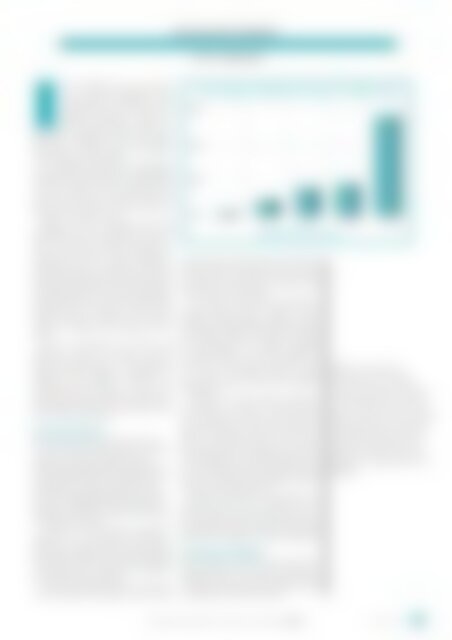CM October 2020
The CICM magazine for credit consumer and commercial credit professionals
The CICM magazine for credit consumer and commercial credit professionals
Create successful ePaper yourself
Turn your PDF publications into a flip-book with our unique Google optimized e-Paper software.
EXCLUSIVE REPORT<br />
AUTHOR – Markus Kuger<br />
IN the Middle Ages, the majority<br />
of the working population were<br />
either farmers or farmhands. It was<br />
an industry that sat at the heart of<br />
Medieval economics. It may be a<br />
far throw from today’s society, but<br />
agriculture is arguably still one of the most<br />
important contributors to the UK economy.<br />
The sector is worth £120bn and employs<br />
approximately 4 million people.<br />
For centuries farming has traditionally<br />
been a family enterprise and most agricultural<br />
businesses in the UK today are still classified<br />
as ‘micro’ businesses. Dun & Bradstreet data<br />
shows that these micro businesses make up<br />
95 percent of the active business population<br />
within the agricultural sector.<br />
Many of these businesses are well<br />
established and our data indicates that more<br />
than half have been in operation for 20 years,<br />
with 15.2 percent of business being over a<br />
decade old according to Dun & Bradstreet’s<br />
proprietary data. As seasoned businesses,<br />
many within the sector will have survived and<br />
learnt from significant events and evolution in<br />
the industry such as swine flu, Mad Cow disease<br />
and TB outbreaks, the outcry over genetically<br />
modified crops, and a rise in demand for plantbased<br />
products. In addition to the current<br />
COVID-19 situation, farmers are also facing<br />
changes to subsidies and regulations due to<br />
Brexit.<br />
But the repercussions of Brexit and<br />
COVID-19 mean that farmers and the<br />
agricultural industry are facing turbulent<br />
times, including changes to subsidies and<br />
regulations. The Medieval foundations of<br />
farming are being shaken to the core and<br />
placing pressure on farmers to adapt to an<br />
evolving environment and assess the potential<br />
risk and opportunity for their business as they<br />
move into the next decade.<br />
FINANCIAL HEALTH<br />
The turbulence in the market over the past<br />
few years and especially recently, has resulted<br />
in some casualties. According to Dun &<br />
Bradstreet’s proprietary data, the number of<br />
UK farming businesses has dropped in the last<br />
four years from 100,198 to 95,317. However,<br />
the number of corporate liquidations in the<br />
sector have stayed relatively flat over the past<br />
two years – although this may change as the<br />
full impact of COVID-19 and the UK’s exit from<br />
the EU becomes clearer.<br />
Positively, our data shows that payment<br />
behaviour in the agriculture industry is<br />
higher than average for the UK, with a higher<br />
percentage of payments being made promptly<br />
by the industry. The amount of bills being paid<br />
on time has risen by 5.5 percent to 57.2 percent<br />
between May 2017 to May <strong>2020</strong>.<br />
Payment performance for the agricultural<br />
sector in Scotland is the highest across the UK,<br />
60%<br />
40%<br />
20%<br />
0%<br />
Percentage of Business by Age as of May <strong>2020</strong><br />
0<br />
1-5<br />
6-10<br />
Business Age in Years<br />
with just under three quarters (74.7 percent) of<br />
payments made on time. Performance worsens<br />
in areas such as Yorkshire, the South East,<br />
South West and North East, but bills are still<br />
being paid at the average rate.<br />
In contrast, the payment performance<br />
of agricultural business in regions such as<br />
Northern Ireland, Greater London, Greater<br />
Manchester, West Midlands and Wales is below<br />
the national average. The latest data shows<br />
positive trends across the industry including<br />
an improvement in prompt payments,<br />
increasing tangible assets and tangible net<br />
worth and a year-on-year increase in sales<br />
of 19 percent, potentially driven by higher<br />
demand for locally sourced food throughout<br />
the pandemic.<br />
However, the high demand throughout<br />
the pandemic is likely to be short-lived as<br />
the UK will enter a deep recession and we<br />
are predicting UK real GDP will contract by<br />
almost ten percent in <strong>2020</strong>. This will have an<br />
effect on household incomes and the longterm<br />
demand for food is expected to decrease.<br />
The rising number of failing businesses is also<br />
concerning given the economic importance of<br />
the sector and debt levels steadily increased<br />
since 2017 with profits decreasing by a third (36<br />
percent) over the same period.<br />
Brexit and COVID-19 are only adding to the<br />
challenges faced and the industry faces yet<br />
more turbulent time and are going to have to<br />
be even more astute in their financial decisions<br />
going forward in order to survive the pending<br />
recession and sluggish economic environment.<br />
THE IMPACT OF BREXIT<br />
The uncertainty of the UK’s exit from the EU<br />
and potential end of free trade across Europe is<br />
weighing heavily on the agricultural industry<br />
with decisions still pending on subsidies, trade<br />
arrangements and labour mobility.<br />
11-20<br />
20+<br />
With one eye on<br />
the future, the New<br />
Trade and Agriculture<br />
Commission recently<br />
announced a set of new<br />
trade policies to better<br />
identify and open up<br />
opportunities for UK<br />
farmers, especially for<br />
SMEs.<br />
Advancing the credit profession / www.cicm.com / <strong>October</strong> <strong>2020</strong> / PAGE 19<br />
continues on page 20 >


















